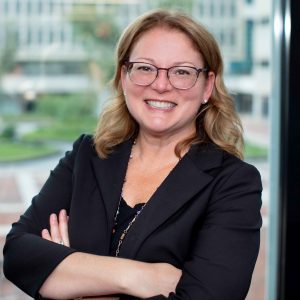Editor’s Note: Board of Trustees Distinguished Professor Sandra Chafouleas shares insights on how lessons from the movie “Inside Out 2” might help post-election minds. This article originally appeared in Psychology Today, where she publishes a blog.
Key Points
- Many are experiencing “big feelings” post-election.
- All emotions have purpose, but it’s important to recognize when feelings may be fueling undesirable behaviors.
- Emotion-coping strategies can be helpful but work in different ways.
- Choice of an emotion-coping strategy needs to fit the person and situation.

Disappointed, angry, anxious, sad, scared, frustrated. The immediate impact of the election outcome means about half of the country could be experiencing these sorts of stormy feelings. The challenge, and concern, is how to effectively cope with those feelings.
Coping does not mean ignoring stormy feelings; each one is important and valid. Just like the “Inside Out 2” movie shows us with leading character Riley, all emotions do have a purpose and can even coexist. For example, during her hockey games, Riley uses both anger and fear to her advantage — anger to bring the energy to her plays and some fear to generate caution and check impulse control. It does, however, mean recognizing when our feelings forecast is too stormy and could be impacting our behaviors. “Inside Out 2” showed us we need to not only be skilled at naming our feelings, but also recognizing when they could get out of control and lead to bad decisions. Riley gives us an example of this when she didn’t act like a team player.
There are lots of ways to tone down stormy feelings and even generate lighter feelings. Riley shows us some in the movie, like deep breathing, visualization, and reaching out to friends. Although she does them, it would have been even better if she had named those strategies as she put them in place throughout the movie. Recognizing feelings is not enough; we need to be able to identify those strategies that work for us to shift those storm clouds, and when they might be most useful.
The same applies to the many strategies that have been shared for dealing with election stress. Lots of options have been offered, but they cannot be expected to work equally well for each person or in every moment. Again, the goal is not to brush away feelings, but to acknowledge and identify when and what types of support could be helpful. This is the case for all ages, adults and kids alike. We can be most successful as a society when adults model identifying a “big feelings” experience, along with the what, why, and when behind their choice of solution for addressing. And it’s even better when we take steps to teach this process to kids, encouraging exploration to find those strategies that work best for them in the particular situation.
The goal is not to brush away feelings, but to acknowledge and identify when and what types of support could be helpful. — Sandra Chafouleas, Board of Trustees Distinguished Professor
In our work building Feel Your Best Self, we have tried to make it easier to do this. Feel Your Best Self is a toolkit that introduces 12 different emotion-coping strategies in ways that are accessible and joyful for both kids and adults. Our approach offers supportive, flexible guidance to explore what works to make emotional navigation simpler. In selecting the strategies to include in the toolkit, we used Gross’ process model of emotion regulation to guide options. Users take their “big feelings” moment and ask themselves what they need to do, such as:
- Do I need to set my situation? These strategies are about prosocial connection, or taking actions to select or modify situations to increase positive emotion, like helping someone or sharing friendly wishes.
- Do I need to refocus my attention? These strategies use distraction or concentration to help shift focus from undesired toward desired emotions, like mindful moments or visualization.
- Do I need to shift my thoughts? These strategies focus on cognitive change through reappraisal of a situation, like looking at something from another perspective.
- Do I need to settle my body? These strategies help alter physiological aspects of an emotional response, like belly breathing or progressive muscle relaxation.
As we grapple with post-election stress and all of the other “big feelings” experiences that will come our way through life, consider your options when it’s feeling too stormy and heavy. Identify which strategies might work, and give them a try to find what works best for you in different moments.
In “Inside Out 2,” Joy was right when telling Anxiety that “You don’t get to choose who Riley is.” We need our emotions to work together in a balance that is appropriate for the moment to help us thrive and be the person we want to be, even through stressful times.



